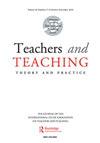变化的警告:探讨职前教师对变化的关注
IF 1.9
2区 教育学
Q2 EDUCATION & EDUCATIONAL RESEARCH
引用次数: 0
摘要
摘要在最近全球改革趋势的修辞中,值得注意的是教师在教育变革过程中从边缘利益相关者到关键利益相关者的(重新)定位。为了应对这一迫切需要,初级教师教育(ITE)方案现在经常承担促进教师代理作为教学核心方面的任务。然而,许多证据表明,作为全球课程改革进程的一部分,教师参与和代理的新愿景与这些愿景的相关制定之间存在持续的紧张关系。虽然教师对个人改革的关注越来越详细,但对教师将变革视为一个过程的观点的关注却很少。以更好地理解和关注教师对变革的关注为前提,有可能支持更真实、更有影响力和更可持续的改革发展,本文探讨了53名爱尔兰职前教师对他们对变革的开放态度的反思,并考察了他们在参与和参与变革时所附加的警告。反身性主题分析确定了职前教师在参与和参与变革时所附加的一系列警告。政策制定者和初级教师教育提供者对这些警告的考虑可能会支持教师更深入地参与变革。关键词:职前教师变更教师关注课程改革专业机构披露声明作者未报告潜在利益冲突。初级阶段是指爱尔兰小学后的前三年教育,主要年龄在12至16岁之间。短期课程设计为大约100小时的学生参与,并为学校提供机会,扩大他们在初级阶段提供的教育经验范围。为了描绘反映的范围,每个参与者都有一个数字。报价归给每个参与者(P),并给出与他们的反映一致的相关数字。作者简介:orla McCormack是利默里克大学教育学院的高级讲师。她的主要教学和研究兴趣集中在教师代理,特别是与课程改革和反思实践有关。雷蒙德·林奇是利默里克大学教育学院的高级讲师。他的研究重点是任务难度、学生动机和成绩之间的关系。Jennifer Hennessy,利默里克大学教育学院讲师。她的研究重点是绩效对教学、学习和评估的影响,以及教师研究在教育中的作用。本文章由计算机程序翻译,如有差异,请以英文原文为准。
Caveats for change: exploring pre-service teachers’ concerns regarding change
ABSTRACTNotable within the rhetoric of recent global reform trends is the (re)positioning of teachers from peripheral to critical stakeholders in educational change processes. Responding to this imperative, programmes of Initial Teacher Education (ITE) are now frequently tasked with promoting teacher agency as a core dimension of teaching. Yet, much evidence points to a persistent tension between renewed visions for teacher engagement and agency as part of global curriculum reform processes and the associated enactment of such visions. While teachers’ concerns related to individual reforms are increasingly detailed, less attention is paid to teachers’ views regarding change as a process. Premised on the conviction that better understanding and attention to teachers’ concerns related to change, holds the potential to support more authentic, impactful and sustainable reform developments, this paper explores the reflections of 53 Irish pre-service teachers on their openness to change and examines the caveats they attach to their engagement in and with change. Reflexive thematic analysis identified a range of caveats pre-service teachers attach to their engagement in and with change. Consideration of these caveats by policy makers and initial teacher education providers may support teachers to engage more deeply with change.KEYWORDS: Pre-service teacherschangeteacher concernscurriculum reform, professional agency Disclosure statementNo potential conflict of interest was reported by the author(s).Notes1. Junior cycle relates to the first three years of post-primary education in Ireland, predominantly ages 12 to 16 years.2. A short course is designed for approximately 100 hours of student engagement and provides opportunities for schools to broaden the range of educational experiences they offer in Junior Cycle.3. In order to portray the range of reflections drawn on, each participant was given a number. Quotes are attributed to each participant (P) and given a relevant number aligned to their reflection.Additional informationNotes on contributorsOrla McCormackOrla McCormack is a Senior Lecturer in the School of Education, University of Limerick. Her main teaching and research interests focus on teacher agency, particularly in relation to curriculum change and reflective practice.Raymond LynchRaymond Lynch is a Senior Lecturer in the School of Education, University of Limerick. His research focuses on the relationship between task difficulty, student motivation and performance.Jennifer HennessyJennifer Hennessy is a Lecturer in the School of Education, University of Limerick. Her research focuses on the impact of performativity on teaching, learning and assessment and the role of teacher research in education.
求助全文
通过发布文献求助,成功后即可免费获取论文全文。
去求助
来源期刊

Teachers and Teaching
EDUCATION & EDUCATIONAL RESEARCH-
CiteScore
4.20
自引率
7.40%
发文量
71
期刊介绍:
Teachers and Teaching: theory and practice provides an international focal point for the publication of research on teachers and teaching, in particular on teacher thinking. It offers a means of communication and dissemination of completed research and research in progress, whilst also providing a forum for debate between researchers. This unique journal draws together qualitative and quantitative research from different countries and cultures which focus on the social, political and historical contexts of teaching as work. It includes theoretical reflections on the connections between theory and practice in teachers" work and other research of professional interest.
 求助内容:
求助内容: 应助结果提醒方式:
应助结果提醒方式:


